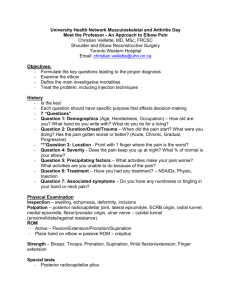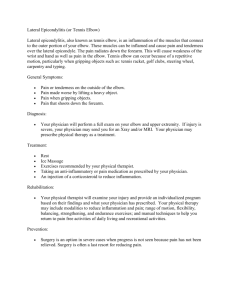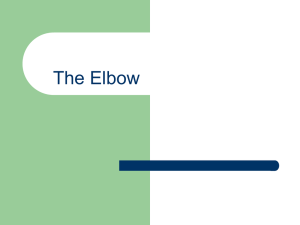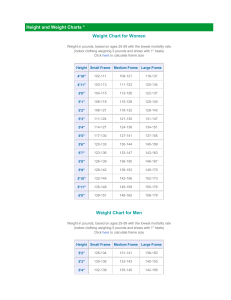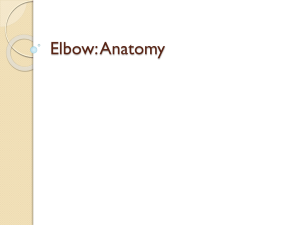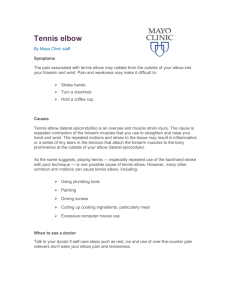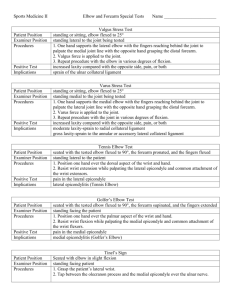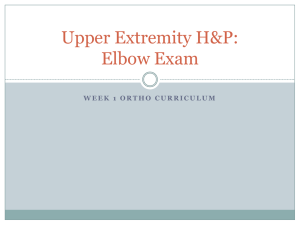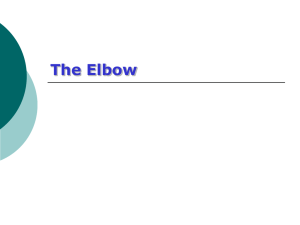Chapter 4
advertisement
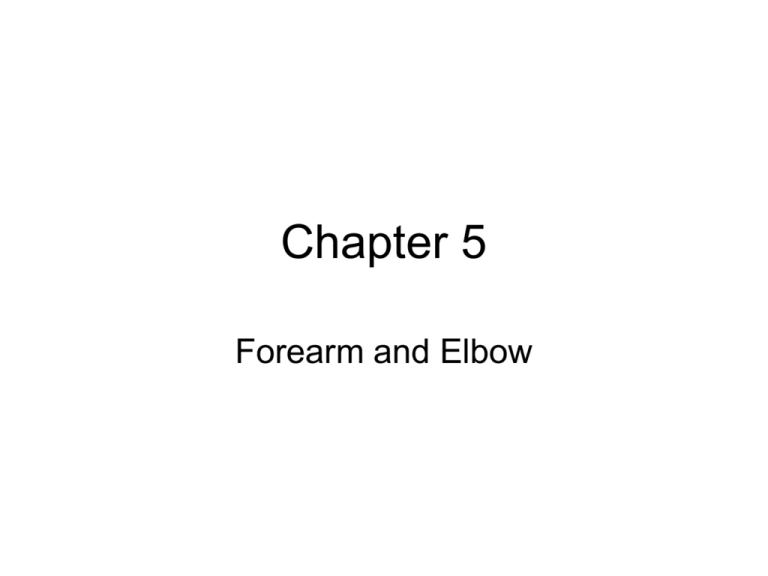
Chapter 5 Forearm and Elbow Forearm • Bones – _________________ • Lateral – ______________ • Medial • Joints – Wrist • _____________ – Elbow • _____________ Radius Anatomy Distal • _____________ – Distal conical projection • _____________ – Depression for head of Ulna • Body (Shaft) Radius Anatomy Proximal • _______________ – Biceps tendon attachment • Neck • __________ Ulna Anatomy Distal • ________________ – Distal Conical projection • Head • Body (Shaft) Ulna Anatomy Proximal • _______________ – Depression for radial head • ______________ – Distal portion of elbow cup • _______________ – Opposite to radial notch off coronoid process Ulna Anatomy Proximal • _____________ – Depression making up the elbow with the Humerus • ______________ – Proximal portion of elbow cup Forearm Imaging Routine • • • • AP Lateral 40”SID 60+ kVp AP Forearm • Have patient sit so when arm is ________ it is ___________ with the table • ____________ hand • Align _________________with cassette • Center to mid forearm. Collimate laterally to skin • Make sure _______________are included Lateral Forearm • • • • Flex ________________ Align _________________to film Sit pt. so _______________with the table Make sure wrist and elbow are on the cassette • Center to mid forearm • Collimate to skin Elbow • Bones – Distal __________ – Proximal ______________ – Proximal __________ • Ginglymus (Hinge) Joint Distal Humerus Medial Condyle • _________________ – ___________ articulating process – Articulates with Ulna • ______________ – Trochlear _____________ • Depressed center groove Distal Humerus Lateral Condyle • _________________ – Lateral articulating process – Articulates with ___________• Head Epicondyles • Lateral _______________ – Lateral projection superior to capitulum • Medial _______________ – Medial projection superior to trochlea – Larger than lateral Elbow Fossa Distal Humerus • Anterior – _______________ • When elbow is flexed radial head “slides” into. – ______________ • When elbow is flexed coronoid process “slides” into. • Posterior – _______________ • When elbow is extended olecranon process “slides” into Fat Pads • _________________ Pads of fat – Can be indicator of joint problems such as fx if displaced or distorted • Located in the ______________ Wrist Fat Pads • _________________ – Seen on PA and Oblique – Just lateral to scaphoid / superior to radius • ________________ – Seen on Lateral – Anterior to Radius Elbow Fat Pads • __________________ – Seen on lateral – Anterior to distal Humerus • __________________ – Generally ________________radiograph – Deep within olecranon fossa • ________________ – Seen on lateral – Anterior to radius Elbow Imaging Routine • • • • • • AP Lateral Internal Oblique External Oblique 40” SID 65+ kVp AP Elbow • Supinate Hand and ____________ • Sit patient so when arm is extended it is level with the table • Align ________________with cassette • Center to mid elbow • Collimate to skin Lateral Elbow • Flex _____________and position _____ into true lateral • Sit pt so when bent arm is extended, humerus is level with the table • Center to mid elbow • Collimate to elbow joint • _____________ should be superimposed. Internal Oblique Elbow • • • • • Extend arm as in AP Pt arm should be level with table ________________ _____________________ Center to mid elbow. Collimate to skin • Done for __________________process External Oblique Elbow • • • • • Extend arm as in AP Pt arm should be level with table Lean pt laterally and rotate arm ___________________ Center at mid elbow. Collimate to skin • Done _________________________
